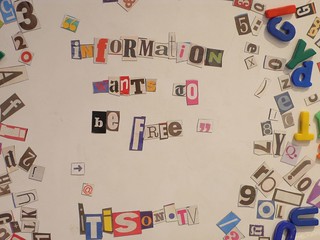
Speaker: Stephen Rhind-Tutt, President, Alexander Street Press
His perspective is primary source collections, mostly video and audio, created by a small company of 100 or so people.
There are billions and trillions of photos, videos, and audio files being added to the Internet every year, and it’s growing year over year. We’re going to need a bigger boat.
He reviewed past presentations at NASIG, and there are reoccurring nightmares of OA replacing publishers, Wikipedia replacing reference sources, vendors will bypass libraries and go direct to faculty, online learning will replace universities, etc.
All technologies evolve and die. Many worry about the future, many hold onto the past, and we’re not responding quickly enough to the user. Dispense with the things that are less relevant. Users don’t want to search, they want to find.
You can project the future, and not just by guessing. You don’t have to know how it’s going to happen, but you can look at what people want and project from that.
Even decades after the motor car was developed, we were still framing it within the context and limitations of the horse-drawn carriage. We’re doing that with our ebooks and ejournals today. If we look to the leaders in the consumer space, we can guess where the information industry is heading.
If we understand the medium, we can understand how best to use it. Louis Kahn says, “Honor the material you use.” The medium of electronic publications favors small pieces (articles, clips) and is infinitely pliable, which means it can be layered and made more complex. Everything is interconnected with links, and the links are more important than the destination. We are fighting against the medium when we put DRM on content, limit the simultaneous use, and hide the metadata.
“I don’t know how long it will take, but I truly believe information will become free.”
Video is a terrible medium for information if you want it fast — 30 min of video can be read in 5 minutes. ASP has noticed that the use of the text content is on par with the use of the associated video content.
Mobile is becoming very important.
Linking — needs to work going out and coming in. The metadata for linking must be made free so that it can be used broadly and lead users to the content.
The researcher wants every piece of information created on every topic for free. From where he is as a publisher, he’s seeing better content moving more and more to open access. And, as a result of that, ASP is developing an open music library that will point to both fee and free content, to make it shareable with other researchers.
In the near future, publishers will be able to make far more money developing the research process ecosystem than by selling one journal.
